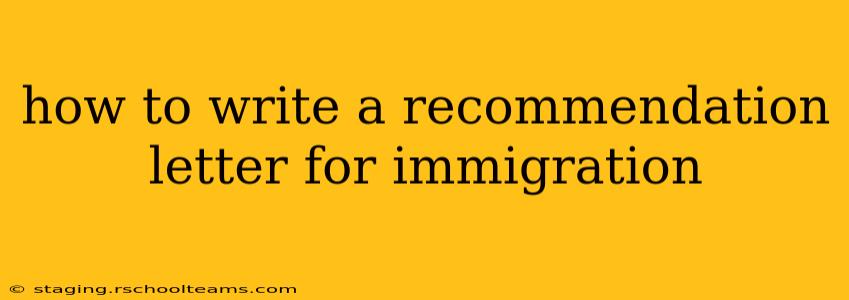How to Write a Powerful Recommendation Letter for Immigration
Immigration processes often require compelling recommendation letters to support an applicant's case. These letters act as crucial evidence, vouching for the applicant's character, skills, and overall suitability for immigration. Writing a strong recommendation letter requires careful consideration and attention to detail. This guide will walk you through the process, ensuring your letter effectively advocates for the applicant.
Before You Begin: Understanding the Requirements
Before you start writing, understand the specific requirements of the immigration authority. Different countries and visa types have varying needs. Crucially:
- Identify the specific form or guidelines: Many immigration processes require a standardized form or provide specific instructions for the letter. Follow these carefully.
- Know the required information: This often includes specific details about your relationship with the applicant, your knowledge of their qualifications, and your assessment of their character.
- Clarify the deadline: Submitting the letter on time is crucial. Ensure you understand the deadlines and plan accordingly.
Understanding Your Role:
You're not just providing a positive assessment; you're presenting a persuasive argument on behalf of the applicant. Your letter should paint a vivid picture of the applicant and their suitability for immigration. Think of yourself as a trusted witness, providing credible evidence to support their application.
Structuring Your Recommendation Letter:
A well-structured letter is easier to read and more impactful. Consider this framework:
1. Introduction:
- Begin by stating your name and contact information: Clearly state your full name, job title, organization, contact number, and email address.
- State your relationship with the applicant: Clearly explain how you know the applicant (e.g., employer, professor, neighbor, personal friend) and for how long.
- State the purpose of your letter: Explicitly state that you are writing to recommend the applicant for immigration to [Country].
2. Body Paragraphs (Focus on Specifics):
This section is crucial. Avoid vague statements. Instead, provide concrete examples to illustrate your points. Address these key areas:
- Applicant's Character: Describe the applicant's personality traits that demonstrate integrity, honesty, and reliability. Provide specific examples. (e.g., "During their time at [Organization], [Applicant's Name] consistently demonstrated exceptional integrity, handling confidential information with utmost discretion and always acting with ethical considerations.")
- Applicant's Skills and Qualifications: Detail the applicant's skills and qualifications relevant to their immigration application. Provide specific examples of their achievements. (e.g., "As a project manager, [Applicant's Name] successfully delivered [Project Name] on time and under budget, demonstrating exceptional leadership and organizational skills.")
- Applicant's Contributions to Society: Describe how the applicant has positively impacted their community or workplace. Provide evidence. (e.g., "As a volunteer at [Organization], [Applicant's Name] dedicated countless hours to [Activity], significantly contributing to [Outcome].")
- Applicant's Future Plans: (If relevant) Briefly address the applicant's plans upon immigrating, showing they have a clear vision and will contribute positively to the new country.
3. Conclusion:
- Reiterate your strong recommendation: Clearly state that you highly recommend the applicant for immigration.
- Offer to provide additional information: Express your willingness to answer any further questions the immigration authorities may have.
- Close professionally: Use a formal closing, such as "Sincerely," or "Respectfully," followed by your signature and typed name.
Frequently Asked Questions (PAA):
-
How long should a recommendation letter be? Aim for one to two pages. Brevity is key, but ensure you provide enough detail to support your recommendation.
-
What if I don't know the applicant very well? If you lack sufficient knowledge to write a strong recommendation, it's best to decline. A weak recommendation can be detrimental.
-
Should I include personal opinions? Focus on observable facts and behaviors. Avoid purely personal opinions that might lack objectivity.
-
What if the applicant has some negative aspects? Focus on the positive attributes that outweigh any shortcomings. If addressing a negative aspect is unavoidable, do so briefly and positively frame it. (e.g., "While [Applicant's Name] faced a challenge with [Issue], they demonstrated resilience and learned valuable lessons from the experience.")
-
Can I use a template? While templates can offer guidance, always personalize the letter to reflect the specific applicant and your relationship with them. A generic letter will lack impact.
By following these guidelines and tailoring your letter to the applicant's specific circumstances, you can create a powerful recommendation letter that significantly strengthens their immigration application. Remember, your letter carries significant weight, so accuracy, professionalism, and careful consideration are paramount.
